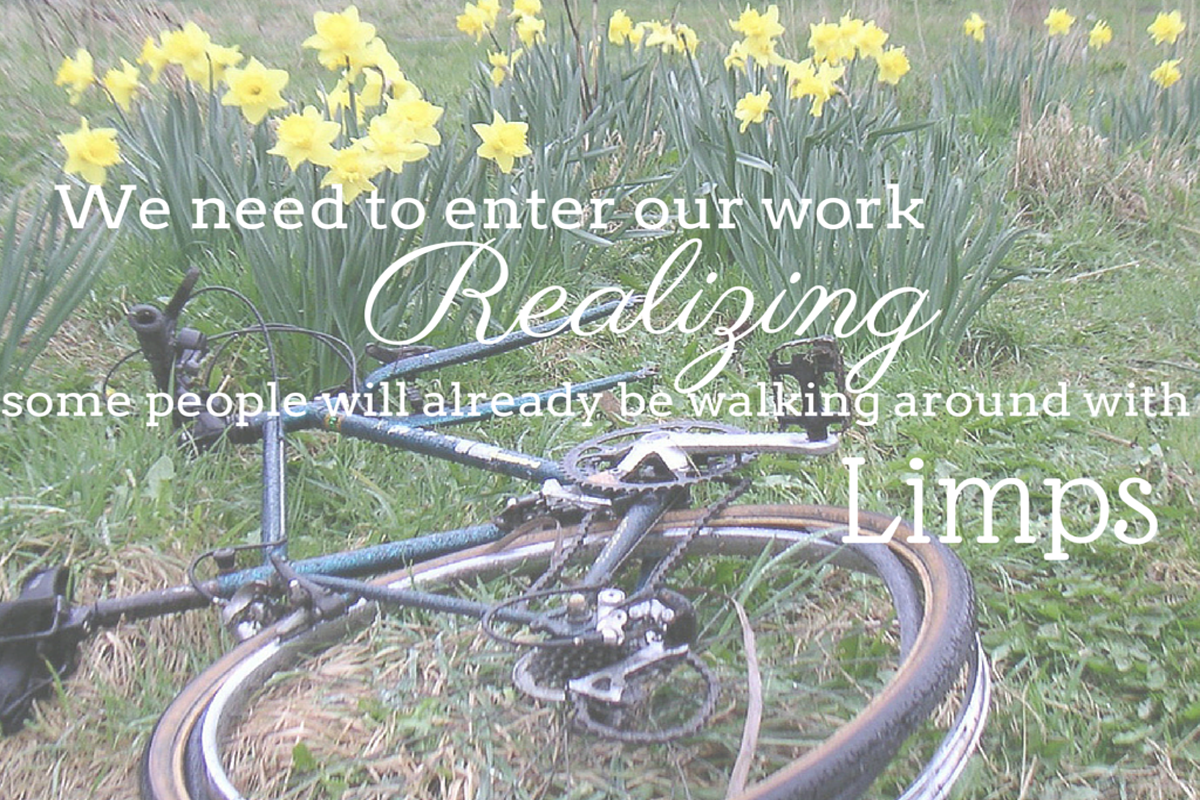Shortly after returning home from the field we had dinner with a good friend. She was a veteran of life overseas and it was refreshing to sit and talk with someone who understood about the ups and downs of life on the field.
As we chatted she shared about a friend of hers who was getting an advanced seminary degree to specialize in counseling overseas workers dealing with mental health issues and general problems they had developed on the field. We nodded vigorously and were encouraged to hear about someone who has a vision and heart for such ministry.
She went on to tell us she had recently shared about this friend with another of our mutual friends. That friend’s reply was, “That’s the dumbest thing I’ve ever heard. Why do overseas workers need something like that?!”
My mouth dropped open. I was dumbfounded. This friend didn’t get it at all.
Maybe it was the weight we were carrying back from the field. We’d seen up close the scars left by years of insufficient member care and mental health issues. I’d glimpsed the ugly firsthand. The way wounds just can’t heal in a place so broken.
When we left for the field in 2010 we never expected to work alongside so many broken people. Granted, some of the folks we worked with had hearts not attuned to Gospel, but we also worked with people who claimed a growing relationship with Christ.
It only confirmed one thing for me. You can’t fix something if you’re broken.
On a daily basis I could look around the expat community and see men and women striving to bind up their own wounds by doing good work on the field.
Yes, we’re all broken, but it is Christ who binds up the brokenness and gives us the grace to minister whole even as broken people. I’d be lying if I said I was expecting to work with a group of emotionally struggling people.
At times it was unclear what we were there to do more of; work with nationals or minister to our expat brothers and sisters who were struggling deeply with their own demons.
How do you write that into a neat and tidy letter home? How do you tell the whole story to supporters and people personally invested in your work?
My reaction to my friend’s story came from a deep place of longing for people at home to truly understand. I never guessed that I would come home from the field with my heart and mind changed so drastically about the reality of what life overseas is like and the toll it can take on a mind.
I thought I knew, but I didn’t.
Her story served as striking proof that there is a deep chasm of understanding between those who serve overseas and those who send us overseas. Part of that chasm exists because the risk of being real about these issues puts our ministries at risk. Admit a struggle and watch your supporters drop like flies.
There is a tendency for us to put people on pedestals who choose to do risky Kingdom work. We assume them to be above the pitfalls and struggles of everyday folk. That’s why when a pastor fails personally or in ministry we recoil in shock. That’s why the idea of an overseas worker having a complete and total breakdown with full on PTSD seems outside of the realm of good Christian service.
Don’t get me wrong. I believe in a call to holiness as believers. What I don’t believe is that anyone, pastor or otherwise, is called to a higher degree of holiness. We are flawed and grace needy and the only way we minister if out of that need for Jesus. But there is a line that can be crossed that leads to burnout and irreparable damage to the mind, body and soul.
There are people we served alongside who will only heal, in this life, by God’s grace.
Along the way some of us will experience wounds that need healing for us to continue on in life and ministry. We need to enter into our work realizing that some of the people we encounter will already be walking around with limps. We also need to know that not everyone back home is going to understand this very real fact.
Have you been surprised by the mental and emotional health or lack therof of co-workers on the field? Do you struggle to tell the whole truth to those back home who support your ministry?
*****
We’re praying that the Velvet Ashes Retreat will bring healing and renewal to many. The retreat will be opening soon! We’ll be launching a bit early to let those of us with slow internet have time to download the videos.





Having had 5 bouts of antenatal depression and now battling remnants of postpartum depression, I have been amazed at the love and support from the expat community in our host country. That community has helped me overcome (for the most part) the embarrassment of being “the broken one” on the field. I had bought into the lie we overseas workers were superhuman and that struggling in the area of mental health meant I was odd man out, shouldn’t be working overseas, and certainly was “less-than” the other expats living and working here. Being honest with our supporters was such a challenge until my husband and I made a commitment to only have supporters we could be completely open with. We prayed for the Lord to provide, and He blessed us with an incredible support base, relationships that are open and honest both ways. I still struggle to be completely honest about my mental health struggles, but God has made the avenue so much smoother. And healing, glorious healing, is an incredible process in a loving and understanding community.
“Institutions help us in two different ways. Institutions (1) aid us in survival and (2) they help us achieve a sense of significance and purpose.
“For example, your workplace provides you with (1) a paycheck and (2) a way to achieve self-esteem by becoming ‘successful.’
“Driven by these fears–survival and self-esteem–we become beholden to these institutions and organizations. We come to idolatrously serve the principalities and powers because they address and reduce our deepest anxieties about material survival and our quest for success, significance and self-esteem.” — Richard Beck
I appreciate what you’ve written here so much, Jessica. I think there is an enormous disconnect between the reality of life overseas and the perception of it in passport countries. I think both sides of the equation–overseas workers and sending churches/agencies–participate in “dancing around the truth” for various reasons. One of the ideas you address here: if you tell the truth, you’ll lose financial support. That’s the fear that keeps one side of the equation in check.
But really, if we’re not telling the truth, if we’re not willing to hear the truth, then probably the entire system is participating in what Richard Beck talks about: we are all idolizing a system that meets important needs for us.
And when we’re doing that, we’re trusting in chariots and horses rather than the Lord our God.
WOW, Kay, you hit it again. Trusting in horses and chariots and not in the Lord our God. This description you’ve given here almost sounds like a systemic version of codependency. Is “systemic codependency” even a thing??? Because this description is sort of creepy — though I think very accurate. “Expectations and Burnout” touches on it a little with the “professional mystique” section, which I thought explained it very well. But this whole idea of a system that people on both sides are idolizing, or using to protect themselves from the truth about themselves and their weaknesses, I think it sheds even more light on it, illuminating it for the unhealthy system it really is. Wow.
Well, I do think that systems fall on a spectrum somewhere between healthy and unhealthy. The unhealthier they are, the more those systems tend to promote compensatory unhealthy behaviors in system members who choose to stay involved. Drinking the koolaid? It happens. I think the less you’re telling the truth, the more unhealthy your system is.
“The less you’re telling the truth, the more unhealthy your system is.” Ouch. I think that explains so much of the last 20-25 years of my life, in both family and church. I think Peter Scazzerro said something like that in “Emotionally Healthy Spirituality”? Something like “you can measure the health of a group or family by how many secrets they’re keeping.” Anyway, yeah, I’m personally starting to get fed up with secrets and how they keep people in bondage. But that’s a long, looooooooooong conversation for another day. 🙂 Heading over to the retreat site now to unwind and process my life — which will probably include some of this stuff 🙂
I’m thankful you wrote this and grateful for the care you are extending to others through your work! I am on the field doing care and have had many people tell me similar things as you have written. They had no idea how hard and complicated things could be and found that people abroad aren’t super heros. The things you wrote here are being reiterated again and again in many people’s hearts. A dear friend of mine once said to me, “until you have had your own heart pricked by the trials of life, it is hard to be someone who can offer that comfort and care to someone else.” That was several years after she had 3 consecutive ectopic a pregnancies on the field and then a series of other hard trials unique to life abroad. And it is these same people who are seeing amazing life change and near miracles in their ministries. It’s not that hurting people aren’t effective. It’s just as you said, no one is immune to needing their own hearts healed. Jesus took time away from the crowds. Even he felt weakness when he said, “watch and pray” in Gethsemane. He didn’t need healing, but he still needed space for caring for himself.
I’m reading this a little late, but this is something I feel very strongly about. I went to the field knowing that overseas workers are normal people, too, but not realizing the extent of the pressures living cross culturally or the stigma in some circles about metal health or even just minor burn out. Our own organization has lots of resources, help, safety nets, etc in place. But we also worked with expats from a variety of other organizations, and I saw some varied situations. The saddest is those who have such classic problems, such as depression, that everyone around them can identify, but they will not get help. This is not always their fault, as some churches and organizations seem to see this as a trust issue. Are you trusting God? Then you won’t be depressed, struggle, etc. The result is that if you admit you have a problem, you are saying that you aren’t able to trust God, and what overseas worker wants to say that?
I forwarded an article to my team that I thought would be helpful. Someone came to talk to me because she was concerned. The author of the article mentioned something her counselor had said, and my friend was concerned that I had written the article. I told her that it wasn’t me. “Oh, good,” she laughed, “I was afraid you had been to a counselor.” I tried to explain that, yes, I have gone to a counselor before, that it’s a healthy thing to do, etc. She was already moving on, and I couldn’t get her attention back to what I was saying. It was eye opening to me, and helped me to understand why some others on our team were so reluctant to seek help for even severe depression that had them bedridden. So sad.
Well said! I always appreciate hearing how other people have processed what they hear folks back in America say. Sometimes I don’t even know how to put it in a category. Some people really understand. And some have no idea. So it is always a bit hard to know how to write updates in a way that speaks their language. There is a large array of levels of understanding among individuals.